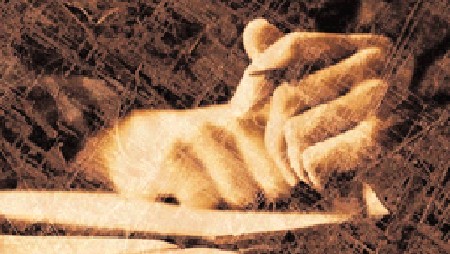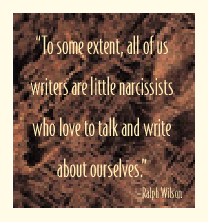
|
Vol.
12. No. 2
|
Fall
2002
|

prizewriters
by Theresa Desmond
The U's top-ranked creative writing program
helps skilled writers hone their craft.
My opinion is that they don’t stifle enough of them.” —Flannery O’Connor
So you want to be a writer?
Step one: Dream big.
"I made up my mind in the fourth grade that I was going to be a professional baseball player and a poet," says Ralph Wilson PhD'93, currently an assistant professor of English at Kennesaw State University in Georgia, a published poet, and a graduate of the U's creative writing program. (Of course, it helped that Wilson received substantial encouragement in fourth grade — his teacher was so impressed with a poem he submitted that she called Wilson's mother and accused him of plagiarism. His mother had to produce the early drafts of the poem — yes, he was revising even as a tyke — to clear her son's name. The baseball part, on the other hand, hasn't quite panned out.)
Step two: Work hard.
"In writing, talent is a distant fourth on the list of what it takes to make it," says Katharine Coles PhD'90, associate professor of English and former director of the U's creative writing program. "First it takes hard work." (For the record, she lists "the ability to be alone in a room for hours" as second, and "luck" as third.)
Step three: Be admitted to the University's creative writing program.
"We have almost a 100 percent placement rate in our Ph.D. program," says Coles. "I think everyone who is serious about an academic career has been placed."
To be sure, not everyone dreams of an academic career and not every writer wants to be a poet or novelist. But if the numbers flocking to creative writing programs at universities across the country are any indication, many do. When an organization called the Associated Writing Programs (AWP) was founded in 1967, membership included 15 writers representing programs at 13 universities; today, AWP says it supports 21,000 writers at more than 320 member colleges and universities. Earlier this year, The Chronicle of Higher Education reported that in the last six years, over 50 colleges have added creative writing offerings for their undergraduates. And there has been a nationwide increase of tenure-track faculty positions in creative writing in recent years.
It could be that the proliferation of chain bookstores, poetry slams, and, until recently, Oprah-promoted, suddenly famous authors has heightened awareness of creative writing.
Coles, however, thinks the draw might be due to a deeper impulse. "How long after those planes flew into the towers did you get a poem by e-mail?" she asks, somewhat rhetorically. "For me, it was within hours. There is a unique way that literature tracks and examines the boundary of the inner life and the outer world. We are sensitive to those boundaries in times of crisis and in times of joy and celebration." She adds, "People want to inhabit that creative space, especially through writers who are educated, who can see the ways that literature and culture interact with one another. Writing programs provide space for the critic-scholar."
 Those
looking to fill that space have a valuable resource in the U's creative
writing program, currently directed by François Camoin. One of
the oldest and most highly regarded in the country, the program offers
both master's (MFA) degrees — which used to be considered the terminal
degree in the field — and Ph.D. degrees. Both degrees require a
combination of creative writing and critical study of literature. "We
could easily expand the MFA program based on the number of applicants,"
says Stuart Culver, chair of the English department, which houses the
creative writing program, "but we decided to focus on the Ph.D.
program. For the Ph.D., it's expected that a graduate wouldn't be simply
a writer but could also teach in an English program at a college or
university." Culver, Coles, and Wilson all emphasize the rigor
of the U's Ph.D. program, a necessity in preparing students for academic
jobs that today require faculty to be well versed in more than one area.
"You can't use an MFA for teaching anymore," Coles says.
Those
looking to fill that space have a valuable resource in the U's creative
writing program, currently directed by François Camoin. One of
the oldest and most highly regarded in the country, the program offers
both master's (MFA) degrees — which used to be considered the terminal
degree in the field — and Ph.D. degrees. Both degrees require a
combination of creative writing and critical study of literature. "We
could easily expand the MFA program based on the number of applicants,"
says Stuart Culver, chair of the English department, which houses the
creative writing program, "but we decided to focus on the Ph.D.
program. For the Ph.D., it's expected that a graduate wouldn't be simply
a writer but could also teach in an English program at a college or
university." Culver, Coles, and Wilson all emphasize the rigor
of the U's Ph.D. program, a necessity in preparing students for academic
jobs that today require faculty to be well versed in more than one area.
"You can't use an MFA for teaching anymore," Coles says.
For students, the chance to work with faculty writers such as Jacqueline Osherow, Donald Revell, and Coles herself is a draw to the program. Graduates have distinguished themselves, as well — for example, David Baker PhD'83 is the poetry editor of the Kenyon Review and director of creative writing at Denison University, T.R. Hummer PhD'80 edits the Georgia Review, and Craig Arnold PhD'01 was the 1998 winner of the Yale Younger Poets competition. As Wilson, Georgia's "Author of the Year [2002]" in poetry, says, "My experience at Utah was indispensable to whatever small success I've had as a poet and teacher."
Coles emphasizes that success really starts with the admissions process. "We choose the right people!" she says with a laugh. "Everyone knows that Houston and Utah are the top two Ph.D. programs. So we get applications from the best poets and writers in the country. They submit both a creative writing sample and a scholarly writing sample, and two different committees look at them. You have to get past both."
If selecting among the top writers in the country seems a difficult task, Coles says the best work usually reveals itself. "It's like what Emily Dickinson said, that she knew good poetry when she felt as if the top of her head were coming off. It's kind of like that. You know when you're in the presence of real beauty."
Those selected will discover the benefits of studying with others who are serious about learning the craft, Wilson believes. "You interact with established writers and learn what makes good writing, what's essential to a piece of literature. It teaches you restraint of emotion, manipulation of tone, things like that," he says. In addition, "You work with, and become friends with, other talented writers. Having peers tell you something isn't very good gives you a different perspective on yourself. And," he adds, "you get the opportunity to write. You have to produce work. You'll find out if you can produce enough work to make a career out of it."
And, of course, if writing
a poem every week — a good one — seems daunting, there's always
professional baseball. ![]()
— Theresa Desmond is editor of Continuum.
Recent Faculty Publications
Being
with Rachel (2002), Karen Brennan
The Golden Years of the Fourth Dimension (2001), Katharine Coles
Arcady (2002), Donald Revell